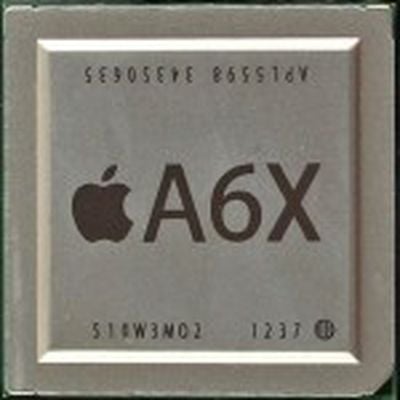 While Apple appears to have been making efforts to diversify its supply chain and move away from courtroom and marketplace foe Samsung, production of one of the company's highest-profile components for its iOS devices remains entrenched at Samsung with the A-series chips.
While Apple appears to have been making efforts to diversify its supply chain and move away from courtroom and marketplace foe Samsung, production of one of the company's highest-profile components for its iOS devices remains entrenched at Samsung with the A-series chips.
There have, however, been rumors that Apple is looking into an alternative supplier for its custom ARM-based chips, with several recent claims suggesting that Apple could switch to TSMC's more efficient 20-nanometer process by late 2013 for introduction in the 2014 generation of iOS devices.
Taipei Times now reports that Apple's rumored timeline for shifting chip production to TSMC may be accelerating, with Credit Suisse analysts claiming that Apple appears set to make the jump as soon as the second quarter of 2013 using TSMC's 28-nanometer process.
The projected timeframe would come “earlier than expected,” Manish Nigam, head of the brokerage's non-Japan Asia technology research division, said in note to clients on Friday, citing their recent checks with several equipment suppliers and other companies in Japan, Taiwan and China.
Previously, Credit Suisse said it expected Apple would seek a second source for its chips other than Samsung Electronics Co by either late next year or early 2014.
Earlier this year it was reported that both Apple and Qualcomm had placed bids to try to secure exclusive access to TSMC's chip production capacity, but the foundry opted not to tie its future so closely to any one company, although it has indicated that it is open to dedicating a factory or two to a single customer.






















Top Rated Comments
This post reminds of all the "Bye-Bye, Google :D" posts when iOS went to Apple Maps.
How'd that work out?
Of course, how things work out in reality and how the media spin it are two different things.*
* I’m not counting the way media spins Maps in Australia because a) I don’t live there and b) you can’t get any media in the wilderness where Maps will dump you.
P.S. One of the good things about ARM is that many companies can manufacture the platform. Samsung is in no way the only successful ARM maker, and Samsung did not design Apple’s chips—Apple did. Nobody will know the difference. (Note that Samsung devices with higher CPU specs “on paper” run slower and burn more power in real-world tests. Computing efficiency does not come from a marketing bullet point alone, nor a chip alone. People are of course free to time travel, comparing Apple 2012 chips with Samsung chips that don’t yet exist in the market; they must be assuming, then, that the amazing things Apple’s chip designers did this last time around are the end of Apple’s chip innovation. Every company has future plans except Apple, some will assume!)
A newer processor is faster than an older one?
It isn't just about highest performance. Efficiency and Performance per Watt are king in mobile devices.
Besides, how is it a surprise an ARM Cortex-A15 clocked at 1.70 Ghz beats the Apple A6/A6X clocked 300-400 Mhz lower based on the same superset.
Even the A6 beats the Exynos 5250 when it comes to graphics performance. AnandTech easily calls Apple's chips for the most well-rounded System-on-a-Chip, offering the better performance per watt.